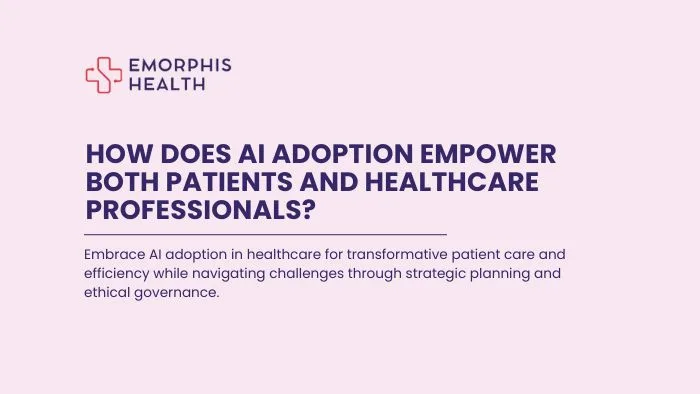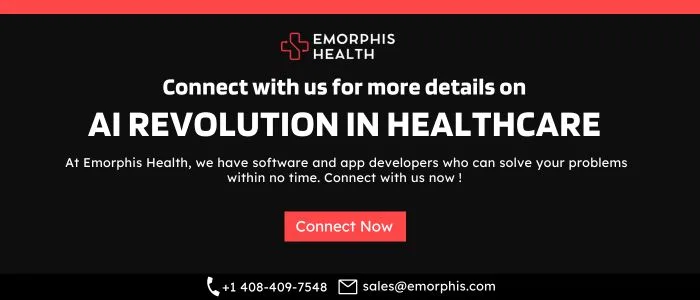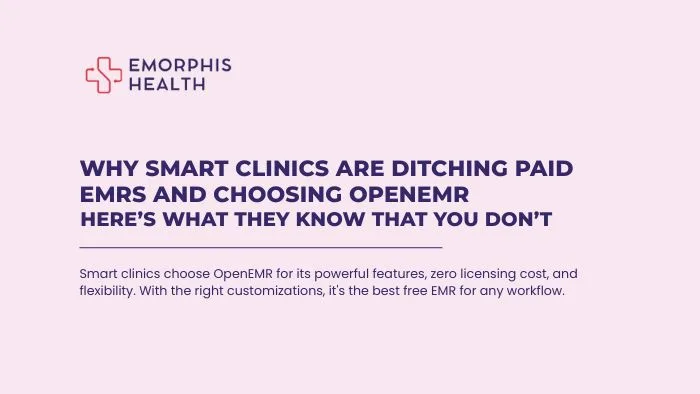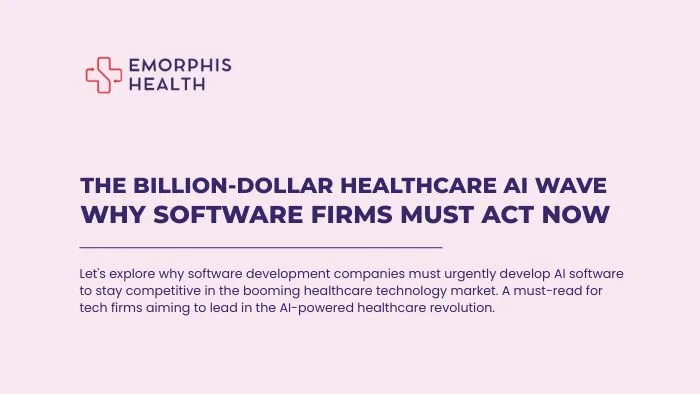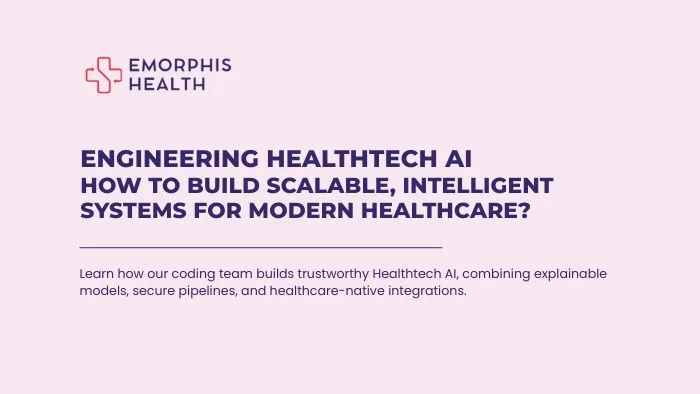What will you learn from this article on AI adoption?
See Contents
- 1 What will you learn from this article on AI adoption?
- 2 AI Adoption in Healthcare
- 3 Current Applications of AI in Healthcare
- 4 Challenges and Limitations in AI Adoption
- 5 Future Trends and Innovations in AI Adoption
- 6 How can AI adoption in healthcare alleviate concerns and fears for both patients and providers?
- 7 Conclusion
- Healthcare professionals express overwhelming anticipation for widespread AI adoption.
- AI adoption is revolutionizing healthcare by enhancing medical imaging, accelerating drug discovery, personalizing treatment plans, and streamlining administrative tasks, ultimately improving patient care and operational efficiency.
- Challenges such as data privacy, regulatory compliance, integration with existing systems, ethical considerations, and algorithm interpretability need to be addressed to ensure responsible and effective AI implementation in healthcare.
- Future trends suggest AI will enable predictive healthcare interventions, personalized care, increased use of robots in healthcare tasks, and breakthrough discoveries in medical science, promising a smarter, more accessible healthcare system for all.
- Addressing concerns and fears for both patients and providers for AI adoption.
AI Adoption in Healthcare
Artificial Intelligence (AI) is poised to revolutionize healthcare. From improving diagnosis to streamlining operations, its potential is vast. According to an article published in Healthcare IT news, a publication of HIMSS Media, reported various key points in AI adoption.
In a recent study conducted by the Berkeley Research Group, a staggering 75% of healthcare professionals expressed their anticipation for widespread implementation of Artificial Intelligence (AI) within the next three years. This positive response underscores the industry’s growing recognition of AI’s potential to revolutionize healthcare. Moreover, the study revealed that an overwhelming 87% of provider respondents are confident in their organizations’ ability to comply with AI regulations, reflecting a strong belief in the readiness of healthcare institutions to embrace this transformative technology.
In a recent podcast, James McHugh, managing director at Berkeley Research Group, delved into the study’s findings, offering valuable insights and advice to CIOs and other health IT leaders. The podcast highlighted the increasing importance of AI adoption in healthcare and the strategic considerations for its successful integration.
More details
Notably, the study also uncovered that nearly 60% of provider respondents are actively investing in internal training and education on AI, with 55% establishing AI-specific guidelines for its proper use. While these initiatives demonstrate proactive efforts to prepare for AI adoption, there’s still more to be done.
Merely 37% of provider respondents stated that their organizations are currently reviewing or intend to review regulatory guidance to ensure the appropriate implementation of AI. Despite this, six in ten provider respondents view current AI regulations as providing adequate safety measures, reflecting optimism in the industry’s ability to navigate regulatory challenges.
However, while optimism prevails, concerns surrounding HIPAA violations, accuracy, safety, data privacy, and ethical standards remain top of mind for healthcare professionals. These considerations underscore the importance of addressing regulatory and ethical implications as AI adoption progresses.
What is the AI adoption role in driving healthcare transformation?
AI, or Artificial Intelligence, is like a smart computer system that can learn and make decisions like humans. In healthcare, AI helps doctors and nurses by analyzing big amounts of data quickly and accurately. With AI adoption, healthcare becomes more efficient and effective. Now, let’s see how AI adoption brings big changes in healthcare.
What are the significance and potential benefits of AI adoption in healthcare?
AI adoption in healthcare means using AI technology to improve how we take care of patients. It assists physicians in diagnosing diseases with greater speed and accuracy. Also, it helps hospitals manage their resources better, making sure patients get the care they need when they need it. Overall, AI adoption makes healthcare better for everyone.
With AI adoption bringing so many benefits, let’s take a closer look at the key areas where AI is making a big difference in healthcare.
In which key areas are AI adoption revolutionizing healthcare?
AI is changing healthcare in many ways. One big area is medical imaging, where AI helps doctors see things more clearly and find problems earlier. Another area is drug discovery, where AI helps scientists find new treatments faster. Also, AI helps with personalized treatment plans, making sure each patient gets the right care for them. With AI adoption, healthcare is becoming smarter and more personalized.
Find details on AI software development
Now that we’ve seen how AI is revolutionizing healthcare, let’s explore the current applications of AI in healthcare.
Current Applications of AI in Healthcare
AI adoption is transforming the landscape of healthcare, revolutionizing how we diagnose, treat, and manage medical conditions. Here are several crucial areas where AI is having a notable influence:
1. Medical Imaging and Diagnostics
AI adoption enhances medical imaging processes, allowing for more accurate and timely diagnoses. AI algorithms can analyze images from MRI, CT scans, and X-rays to detect abnormalities and assist radiologists in interpreting results. This leads to faster diagnosis and improved patient outcomes.
2. Drug Discovery and Development
AI adoption speeds up drug discovery by scrutinizing extensive datasets to pinpoint potential drug candidates and forecast their efficacy. AI algorithms can simulate biological processes, predict drug interactions, and optimize drug design, leading to the development of safer and more effective treatments.
3. Personalized Treatment Plans
AI adoption enables personalized medicine by analyzing patient data, including genetic information, medical history, and lifestyle factors, to tailor treatment plans to individual patients. AI algorithms can identify optimal treatment options, predict treatment responses, and optimize medication dosages, resulting in better outcomes and fewer adverse reactions.
4. Administrative Tasks and Operational Efficiency
AI adoption streamlines administrative tasks and improves operational efficiency in healthcare organizations. AI-powered chatbots and virtual assistants can handle appointment scheduling, answer patient inquiries, and assist with administrative tasks, freeing up healthcare professionals to focus on patient care. Additionally, AI algorithms can optimize resource allocation, predict patient admission rates, and streamline workflow processes, leading to cost savings and improved healthcare delivery.
AI adoption is revolutionizing healthcare by improving diagnostic accuracy, accelerating drug discovery, personalizing treatment plans, and enhancing operational efficiency. As healthcare organizations continue to integrate AI technologies into their practices, we can expect to see further advancements in patient care and outcomes.
As AI adoption continues to revolutionize healthcare by enhancing diagnostic accuracy, accelerating drug discovery, and optimizing treatment plans, it also presents a set of challenges and limitations that need to be addressed.
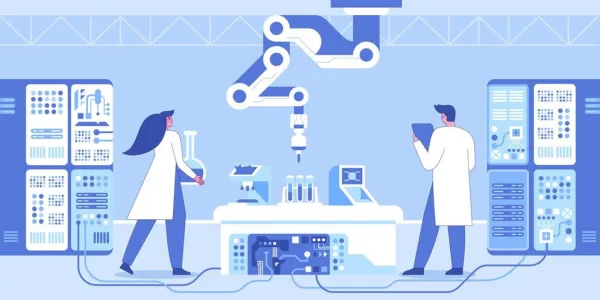
Challenges and Limitations in AI Adoption
While AI adoption holds immense promise for revolutionizing healthcare, it also presents several challenges and limitations that need to be addressed:
a. Data Privacy and Security Concerns
One of the primary challenges in AI adoption is ensuring the privacy and security of patient data. Healthcare organizations are required to adhere to stringent regulations like HIPAA in order to safeguard patient confidentiality. Additionally, the use of AI algorithms may raise concerns about data breaches and unauthorized access, requiring robust security measures and encryption protocols.
b. Regulatory Hurdles
Regulatory compliance poses a significant challenge in AI adoption, as healthcare organizations must navigate complex legal frameworks governing the use of AI technologies. Ensuring compliance with regulations such as FDA approvals and GDPR requirements adds a layer of complexity to AI implementation and may delay adoption efforts.
c. Integration with Existing Systems and Workflows
Integrating AI technologies into existing healthcare systems and workflows presents logistical challenges, as it requires compatibility with legacy systems and interoperability with electronic health records (EHRs) and other digital platforms. Healthcare organizations must invest in IT infrastructure upgrades and customization to ensure seamless integration and minimize disruption to clinical workflows.
d. Ethical Considerations
Ethical considerations surrounding AI adoption in healthcare include concerns about algorithmic bias, fairness, and accountability. AI algorithms may perpetuate biases present in training data, leading to disparities in healthcare delivery and exacerbating existing inequities. Ensuring transparency, fairness, and accountability in AI decision-making processes is essential to mitigate ethical risks and promote trust among patients and healthcare professionals.
e. Limited Generalizability and Interpretability
AI algorithms trained on specific datasets may lack generalizability to diverse patient populations or clinical settings, limiting their effectiveness and reliability in real-world applications. Furthermore, the black-box nature of some AI models makes it challenging to interpret their decisions and understand the underlying reasoning behind recommendations, raising concerns about algorithmic transparency and trustworthiness.
While AI adoption holds the potential to revolutionize healthcare delivery, addressing challenges such as data privacy, regulatory compliance, integration, ethical considerations, and interpretability is essential to ensure responsible and effective implementation. By proactively addressing these challenges, healthcare organizations can harness the transformative power of AI to improve patient care and outcomes while safeguarding privacy, fairness, and transparency.
While addressing challenges such as data privacy, regulatory compliance, and ethical considerations is crucial, it’s equally important to look ahead at the future trends and innovations that will shape AI adoption in healthcare.
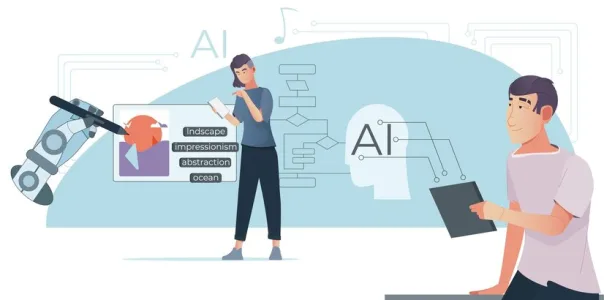
Future Trends and Innovations in AI Adoption
In the future, AI adoption will continue to shape the landscape of healthcare with several exciting trends and innovations. Healthcare professionals will leverage AI to make smarter predictions about diseases and health issues, enabling proactive interventions before problems escalate. Personalized care will become the norm as AI algorithms tailor treatment plans to individual patients based on their unique needs and medical histories. Additionally, robots will play a more prominent role in healthcare settings, assisting with tasks such as medication delivery, surgical procedures, and patient care. Virtual health assistants powered by AI will provide round-the-clock support, offering medical advice and scheduling appointments with ease.
Moreover, AI adoption will fuel breakthrough discoveries in medical science by analyzing vast amounts of data to uncover new insights and treatments for diseases. As AI continues to evolve and integrate into healthcare practices, it promises to make healthcare smarter, more personalized, and more accessible for everyone.
How can AI adoption in healthcare alleviate concerns and fears for both patients and providers?
AI adoption in healthcare offers several assurances that address concerns and fears for both patients and providers:
i. Improved Operational Efficiency
AI technologies streamline administrative tasks and clinical workflows, allowing for more efficient resource allocation and reduced operational costs. This not only improves provider productivity but also enhances the overall patient experience by minimizing wait times and administrative burdens.
ii. Enhanced Data Security and Compliance
AI adoption in healthcare is accompanied by stringent data security measures and compliance with regulatory standards such as HIPAA. Implementing robust data encryption protocols and access controls helps to safeguard patient information, ensuring compliance with regulatory requirements and mitigating risks associated with data breaches.

iii. Ethical and Transparent AI Governance
By establishing transparent governance frameworks and ethical guidelines for AI adoption, it can address concerns related to algorithmic bias, fairness, and accountability. This fosters trust among patients and providers in the responsible deployment of AI solutions.
iv. Continuous Monitoring and Quality Improvement
The continuous monitoring and evaluation of AI systems helps ensure its effectiveness, reliability, and safety. By implementing robust monitoring tools and performance metrics, they can identify and address any issues or discrepancies, thereby instilling confidence in the reliability of AI-driven processes.
v. Strategic Investment in Education and Training
Prioritizing investment in education and training programs equips healthcare staff with the necessary skills and knowledge to effectively utilize AI technologies. Providing comprehensive training on AI tools and methodologies, empowers providers to leverage AI solutions to improve patient care outcomes while addressing concerns about technology adoption.
vi. Alignment with Organizational Goals and Patient-centric Approach
Ensuring that AI adoption strategies align with the broader organizational goals and objectives, emphasizing a patient-centric approach to healthcare delivery. By focusing on solutions that enhance patient outcomes and satisfaction, they demonstrate a commitment to leveraging AI technologies for the benefit of both patients and providers.
Through strategic planning, ethical governance, and a commitment to continuous improvement, leveraging AI adoption in healthcare addresses concerns and fears for both patients and providers, ultimately driving positive outcomes and transformative change within healthcare organizations.
Conclusion
In conclusion, the journey of AI adoption in healthcare is one marked by excitement, challenges, and transformative potential. As healthcare professionals eagerly anticipate the widespread integration of AI technologies, they are met with the reality of navigating complex regulatory landscapes and addressing ethical considerations. However, amidst these challenges lies a promising future where AI revolutionizes patient care, streamlines operations, and drives innovation.
Find details on AI software development
By embracing strategic planning, ethical governance, and continuous learning, stakeholders can harness AI’s power to address concerns for patients and providers. Improved efficiency, enhanced data security, and a patient-centric approach pave the way for a smarter, more accessible healthcare system. This shift toward AI represents more than a trend—it’s a fundamental transformation empowering personalized, efficient, and equitable care for all, anchored in responsible innovation for a brighter healthcare future.
For further insights and detailed guidance on navigating the complexities of AI adoption in healthcare, consider connecting with Emorphis Health. With a wealth of experience and expertise in healthcare technology solutions, Emorphis Health specializes in assisting organizations in leveraging AI to optimize patient care, streamline operations, and drive innovation. Whether you’re seeking assistance with regulatory compliance, data security, or strategic implementation of AI technologies, the team at Emorphis Health is dedicated to providing tailored solutions to meet your specific needs. By partnering with Emorphis Health, you can access the resources and support necessary to embark on a successful journey towards harnessing the transformative power of AI in healthcare.
Connect with us for Healthcare software product engineering.

